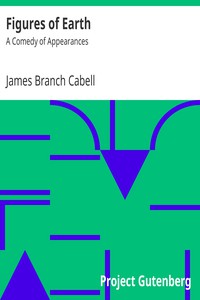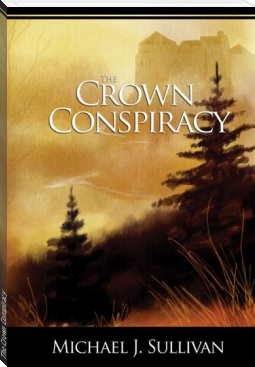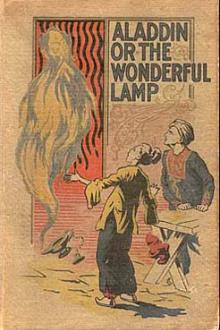Figures of Earth: A Comedy of Appearances by James Branch Cabell (best reads .TXT) 📗

- Author: James Branch Cabell
Book online «Figures of Earth: A Comedy of Appearances by James Branch Cabell (best reads .TXT) 📗». Author James Branch Cabell
Then Miramon said: "All this being duly performed and well rid of, we do not now violate any messianic etiquette if we forthwith set about the redemption of Poictesme. Now then, would you prefer to redeem with the forces of good or with the forces of evil?"
"Not with the forces of evil," said Manuel, "for I saw many of these in the high woods of Dun Vlechlan, and I do not fancy them as allies. But are good and evil all one to you of the Léshy?"
"Why should we tell you, Manuel?" says the magician.
"That, Miramon, is a musty reply."
"It is not a reply, it is a question. And the question has become musty because it has been handled so often, and no man has ever been able to dispose of it."
Manuel gave it up, and shrugged. "Well, let us conquer as we may, so that God be on our side."
Miramon replied: "Never fear! He shall be, in every shape and attribute."
So Miramon did what was requisite, and from the garrets and dustheaps of Vraidex came strong allies. For, to begin with, Miramon dealt unusually with a little fish, and as a result of these dealings came to them, during the afternoon of the last Thursday in September, as they stood on the seashore north of Manneville, a darkly colored champion clad in yellow. He had four hands, in which he carried a club, a shell, a lotus and a discus; and he rode upon a stallion whose hide glittered like new silver.
Manuel said, "This is a good omen, that the stallion of Poictesme should have aid brought to it by yet another silver stallion."
"Let us not speak of this bright stallion," Miramon hastily replied, "for until this Yuga is over he has no name. But when the minds of all men are made clear as crystal then a christening will be appointed for this stallion, and his name will be Kalki, and by the rider upon this stallion Antan will be redeemed."
"Well," Manuel said, "that seems fair enough. Meanwhile, with this dusky gentleman's assistance, I gather, we are to redeem Poictesme."
"Oh, no, Dom Manuel, he is but the first of our Redeemers, for there is nothing like the decimal system, and you will remember it was in our treaty that in Poictesme all things are to go by tens forever."
Thereafter Miramon did what was requisite with some acorns, and the splutterings were answered by low thunder. So came a second champion to aid them. This was a pleasant looking young fellow with an astonishingly red beard: he had a basket slung over his shoulder, and he carried a bright hammer. He rode in a chariot drawn by four goats.
"Come, this is certainly a fine stalwart fighting-man," says Manuel, "and to-day is a lucky day for me, and for this ruddy gentleman also, I hope."
"To-day is always his day," Miramon replied, "and do you stop interrupting me in my incantations, and hand me that flute."
So Manuel stayed as silent as that brace of monstrous allies while Miramon did yet another curious thing with a flute and a palm-branch. Thereafter came an amber-colored champion clad in dark green, and carrying a club and a noose for the souls of the dead. He rode upon a buffalo, and with him came an owl and a pigeon.
"I think—" said Manuel.
"You do not!" said Miramon. "You only talk and fidget, because you are upset by the appearance of your allies; and such talking and fidgeting is very disturbing to an artist who is striving to reanimate the past."
Thus speaking, Miramon turned indignantly to another evocation. It summoned a champion in a luminous chariot drawn by scarlet mares. He was golden-haired, with ruddy limbs, and was armed with a bow and arrows: he too was silent, but he laughed, and you saw that he had several tongues. After him came a young shining man who rode on a boar with golden bristles and bloodied hoofs: this warrior carried a naked sword, and on his back, folded up like a cloth, was a ship to contain the gods and all living creatures. And the sixth Redeemer was a tall shadow-colored person with two long gray plumes affixed to his shaven head: he carried a sceptre and a thing which, Miramon said, was called an ankh, and the beast he rode on was surprising to observe, for it had the body of a beetle, with human arms, and the head of a ram, and the four feet of a lion.
"Come," Manuel said, "but I have never seen just such a steed as that."
"No," Miramon replied, "nor has anybody else, for this is the Hidden One. But do you stop your eternal talking, and pass me the salt and that young crocodile."
With these two articles Miramon dealt so as to evoke a seventh ally. Serpents were about the throat and arms of this champion, and he wore a necklace of human skulls: his long black hair was plaited remarkably; his throat was blue, his body all a livid white except where it was smeared with ashes. He rode upon the back of a beautiful white bull. Next, riding on a dappled stag, came one appareled in vivid stripes of yellow and red and blue and green: his face was dark as a raincloud, he had one large round eye, white tusks protruded from his lips, and he carried a gaily painted urn. His unspeakable attendants leaped like frogs. The jolliest looking of all the warriors came thereafter, with a dwarfish body and very short legs; he had a huge black-bearded head, a flat nose, and his tongue hung from his mouth and waggled as he moved. He wore a belt and a necklace, and nothing else whatever except the plumes of the hawk arranged as a head-dress: and he rode upon a great sleek tortoise-shell cat.
Now when these unusual appearing allies stood silently aligned before them on the seashore, Dom Manuel said, with a polite bow toward this appalling host, that he hardly thought Duke Asmund would be able to withstand such Redeemers. But Miramon repeated that there was nothing like the decimal system.
"That half-brother of mine, who is lord of the tenth kind of sleeping, would nicely round off this dizain," says Miramon, scratching his chin, "if only he had not such a commonplace, black-and-white appearance, apart from being one of those dreadful Realists, without a scrap of aesthetic feeling—No, I like color, and we will levy now upon the West!"
So Miramon dealt next with a little ball of bright feathers. Then a last helper came to them, riding on a jaguar, and carrying a large drum and a flute from which his music issued in the shape of flames. This champion was quite black, but he was striped with blue paint, and golden feathers grew all over his left leg. He wore a red coronet in the shape of a rose, a short skirt of green paper, and white sandals; and he carried a red shield that had in its centre a white flower with the four petals placed crosswise. Such was he who made up the tenth.
Now when this terrible dizain was completed the lord of the seven madnesses laid fire to a wisp of straw, and he cast it to the winds, saying that thus should the anger of Miramon Lluagor pass over the land. Then he turned to these dreadful ten whom he had revivified from the dustheaps and garrets of Vraidex, and it became apparent that Miramon was deeply moved.
Said Miramon:
"You, whom I made for man's worship when earth was younger and fairer, hearken, and learn why I breathe new life into husks from my scrap-heaps! Gods of old days, discrowned, disjected, and treated as rubbish, hark to the latest way of the folk whose fathers you succored! They have discarded you utterly. Such as remember deride you, saying:
"'The brawling old lords that our grandfathers honored have perished, if they indeed were ever more than some curious notions bred of our grandfathers' questing, that looked to find God in each rainstorm coming to nourish their barley, and God in the heat-bringing sun, and God in the earth which gave life. Even so was each hour of their living touched with odd notions of God and with lunacies as to God's kindness. We are more sensible people, for we understand all about the freaks of the wind and the weather, and find them in no way astounding. As for whatever gods may exist, they are civil, in that they let us alone in our lifetime; and so we return their politeness, knowing that what we are doing on earth is important enough to need undivided attention.'
"Such are the folk that deride you, such are the folk that ignore the gods whom Miramon fashioned, such are the folk whom to-day I permit you freely to deal with after the manner of gods. Do you now make the most of your chance, and devastate all Poictesme in time for an earlyish supper!"
The faces of these ten became angry, and they shouted, "Blaerde Shay Alphenio Kasbue Gorfons Albuifrio!"
All ten went up together from the sea, traveling more swiftly than men travel, and what afterward happened in Poictesme was for a long while a story very fearful to hear and heard everywhere.
Manuel did not witness any of the tale's making as he waited alone on the seashore. But the land was sick, and its nausea heaved under Manuel's wounded feet, and he saw that the pale, gurgling, glistening sea appeared to crawl away from Poictesme slimily. And at Bellegarde and Naimes and Storisende and Lisuarte, and in all the strongly fortified inland places, Asmund's tall fighting-men beheld one or another of the angry faces which came up from the sea, and many died swiftly, as must always happen when anybody revives discarded dreams, nor did any of the Northmen die in a shape recognizable as human.
When the news was brought to Dom Manuel that his redemption of Poictesme was completed, then Dom Manuel unarmed, and made himself presentable in a tunic of white damask and a girdle adorned with garnets and sapphires. He slipped over his left shoulder a baldric set with diamonds and emeralds, to sustain the unbloodied sword with which he had conquered here as upon Vraidex. Over all he put on a crimson mantle. Then the former swineherd concealed his hands, not yet quite healed, with white gloves, of which the one was adorned with a ruby, and the other was a sapphire; and, sighing, Manuel the Redeemer (as he was called thereafter) entered into his kingdom, and they of Poictesme received him far more gladly than he them.
Thus did Dom Manuel enter into the imprisonment of his own castle and into the bonds of high estate, from which he might not easily get free to go a-traveling everywhither, and see the ends of this world and judge them. And they say that in her low red-pillared palace Suskind smiled contentedly and made ready for the future.
TO
JOSEPH HERGESHEIMER
Thus Manuel reigned in vertue and honoure with that noble Ladye his wyfe: and he was beloued and dradde of high and lowe degree, for he dyde ryghte and iustice according to the auncient Manner, kepynge hys land in dignitie and goode Appearance, and hauynge the highest place in hys tyme.
XXXIII Now Manuel Prospers
They of Poictesme narrate fine tales as to the deeds that Manuel the Redeemer performed and incited in the days of his reign. They tell also many things that seem improbable, and therefore are not included in this book: for the old songs and tales incline to make of Count Manuel's heydey a rare golden age.
So many glorious exploits are, indeed, accredited to Manuel and to the warriors whom he gathered round him in his famous Fellowship of the Silver Stallion,—and among whom, Holden and courteous Anavalt and Coth the Alderman and Gonfal and Donander had the pre-eminence, where all were hardy,—that it is very difficult to understand how so brief a while could have continued so many doings. But the tale-tellers of Poictesme have been long used to say of a fine action,—not falsely, but misleadingly,—"Thus it was in Count Manuel's time," and the tribute by and by has been accepted as a dating. So has chronology been hacked to make loftier his fame, and the glory of Dom Manuel has been a magnet that has drawn to itself the magnanimities of other days and years.
But there is no need here to speak of these legends, about the deeds which were performed by the Fellowship of the Silver Stallion, because these stories are recorded elsewhere. Some may be true, the





Comments (0)